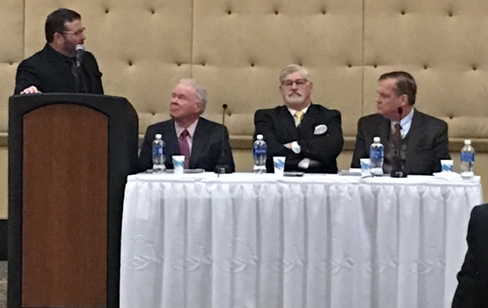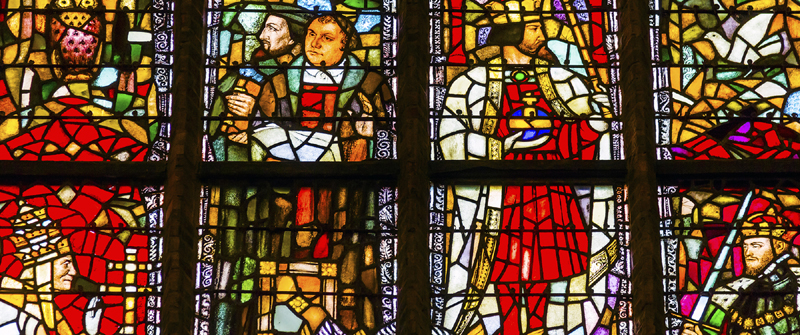
PROVIDENCE, R.I. (BP) — “The Heritage of the Reformation” was the theme at this year’s annual meeting of the Evangelical Theological Society, where Southern Baptists delivered nearly a third of the gathering’s presentations and Trinity International University President David Dockery was elected president.
According to a count by Baptist Press, some 185 of the Nov. 15-17 meeting’s approximately 600 presentations were offered by scholars with ties to Southern Baptist churches, Southern Baptist Convention seminaries and colleges that partner with Baptist state conventions.
Dockery, a Southern Baptist who has participated in ETS since the late 1970s, was elected president Nov. 17 following a year of service as president-elect and program chair.
“It is a great privilege to serve the larger evangelical world in this way,” Dockery, former president of Union University, said in a news release. “I am genuinely grateful for and honored by this special opportunity of service.”
Gregg Allison of Southern Baptist Theological Seminary was reelected ETS secretary, and two Southern Baptists — Jason Duesing of Midwestern Baptist Theological Seminary and James Hamilton of Southern — were elected to the society’s nominations committee.
 Professors from all six SBC seminaries presented papers at ETS, with many focusing on the meeting’s Reformation theme to honor the 500th anniversary of when Martin Luther posted 95 Theses on a church door in Wittenberg, Germany. That event is considered by many to mark the beginning of the Protestant Reformation.
Professors from all six SBC seminaries presented papers at ETS, with many focusing on the meeting’s Reformation theme to honor the 500th anniversary of when Martin Luther posted 95 Theses on a church door in Wittenberg, Germany. That event is considered by many to mark the beginning of the Protestant Reformation.
Early Anabaptist scholar remembered
Chris Chun, associate professor of church history at Gateway Seminary, presented a paper on the late Southwestern Seminary church historian Albert Henry Newman — “one of the first historians to cast a positive light to sixteenth-century Anabaptists,” as Chun put it.
Anabaptists were part of the so-called “Radical Reformation,” a movement of 16th-century Christians who left the Roman Catholic Church but didn’t believe the Magisterial Reformers — as Martin Luther, John Calvin and company have come to be known — went far enough in purifying the church.
Newman — a member of Southwestern Baptist Theological Seminary’s faculty when the seminary relocated from Waco to Fort Worth in 1910 — gave a mixed assessment of Magisterial Reformers, Chun wrote. Luther and company, Newman claimed, helpfully brought some biblical doctrines to light but wrongly advocated infant baptism in order to preserve a union of church and state.
Anabaptists, in contrast, were the “apex of the sixteenth-century Reformation … according to Newman,” Chun wrote, with their emphasis on regenerate church membership, their rejection of infant baptism and their “repudiation of the connection between church and state” among other distinctives.
Chun commended Newman for being one of “the first historians” in America to remove the “stigma” traditionally associated with Anabaptists by distinguishing heretical Anabaptists from “soundly biblical Anabaptists.”
Newman did not believe there was an unbroken line of baptistic churches stretching from the Apostles through the Anabaptists to modern Baptists, but he did claim a “spiritual kinship” between Anabaptists and Baptists, Chun wrote.
Anabaptist women
Candi Finch, assistant professor of theology in women’s studies at Southwestern Seminary, presented a paper on Anabaptist women of the Reformation. Among the thousands of Anabaptists martyred at the hands of both Protestants and Catholics, a third were women, she wrote.
“Much of what is known [about Anabaptist women] has come to us through court testimonies and letters and hymns composed by them while imprisoned,” Finch wrote. “These remarkable women showed maturity of their faith during trials and a deep understanding of Scripture; they displayed extraordinary courage and a steely resolve not to abandon their faith, knowing that a conversion to Anabaptism almost guaranteed a death by execution.”
Because Reformation-era authorities believed defendants could be convicted of crimes only if they confessed, Finch wrote, those accused of “Anabaptist leanings” often endured “gruesome torture” in an effort to make them either recant their views or confess.
Under such torture, Anabaptist women displayed “steadfastness” and “joy,” Finch wrote, while “praying and pleading for the souls of their persecutors.”
Finch concluded, “I am grateful for the great cloud of witnesses of these Anabaptist women who accepted the reality of suffering … In their valiant deaths, they encourage sisters and brothers today to continue to run the race set before them with endurance, fixing their eyes on Jesus, the author and perfecter of our faith.”
Calvin on church & state
William Henard, executive director of the West Virginia Convention of Southern Baptists, presented a paper on Calvin’s view of the separation of church and state. The Genevan Reformer’s view that church and state should be separate but mutually influential and that both bear God-given authority, Henard wrote, later “played an important role in the way governments were developed, especially those in colonial America.”
In Calvin’s view, the church should be “more involved in influencing and directing the affairs of the state than the state [is] in engaging the issues facing the church,” wrote Henard, who serves as an adjunct professor at Southern Seminary. “Calvin was attempting to build a one-sided wall, one which the church could cross but not the secular government.”
That notion was resisted by civil magistrates in 16th-century Geneva, where Calvin was a church leader, Henard wrote, and at times Calvin’s preference for civil government did not prevail. In addition, Calvin’s conduct sometimes trampled modern notions of religious liberty, Henard noted, as when he supported the execution of individuals holding heretical theology.
Yet Calvin’s thinking departed from the common thinking in his time that church and state should be united, Henard wrote.
Some of Calvin’s ideas on church and state “are significant because they become the basis for the belief system of those who would later become some of the primary settlers and founders of America,” Henard wrote, “specifically the Puritans and the Separatists, and the framers of the Constitution of the United States.”
Next year’s ETS annual meeting is Nov. 13-15 in Denver, Colo.

















